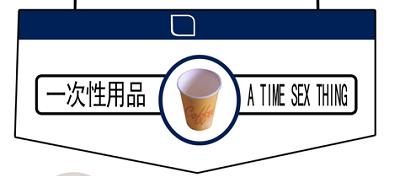August 08, 2007
It's a time sex thing, baby
From Victor Mair (and originally from here), another adventure in Chinese-English translation.
 This label shows a disposable coffee cup and a bilingual legend whose English half is "A TIME SEX THING". But it's not from the cover of a racy new novel about coffee-break quickies among over-scheduled young Hong Kong investment bankers. Nor is it from the latest CD by the Shanghai rockers Assembly Line Love Machine. It's not even the lead-in to a shocking tabloid exposé of caffeine-fueled Olympic stopwatch-fetishism in the Beijing elite. No, it's a word-by-word mistranslation into English, apparently without ironic intent, of the distinctly un-erotic Chinese phrase:
This label shows a disposable coffee cup and a bilingual legend whose English half is "A TIME SEX THING". But it's not from the cover of a racy new novel about coffee-break quickies among over-scheduled young Hong Kong investment bankers. Nor is it from the latest CD by the Shanghai rockers Assembly Line Love Machine. It's not even the lead-in to a shocking tabloid exposé of caffeine-fueled Olympic stopwatch-fetishism in the Beijing elite. No, it's a word-by-word mistranslation into English, apparently without ironic intent, of the distinctly un-erotic Chinese phrase:
一次性 用品 = YI1CI4XING4 YONG4PIN3
Victor breaks it down for us:
The individual syllables of this phrase signify:
YI1 "one"
CI4 "time; occasion" (as well as many other meanings that are not relevant here)
XING4 "nature, character, quality; sex"
YONG4 "use"
PIN3 "article, product" (as well as many other meanings that are not relevant here).
Puting it together, YI1CI4XING4 is an adjective modifying the noun YONG4PIN3.
YONG4PIN3 means "article for (daily) use," which comes out in the illustrated Chinglish phrase as "thing" (not too bad).
YI1CI4XING4 is much harder, because it is a fairly recent neologism, and not many people are familiar with it, although I've been hearing it occasionally for the last 15 years or so. The translator chose to render each syllable of the trisyllabic adjective YI1CI4XING4 individually: "a time sex" (he / she was thinking "one" = "a"). In fact, YI1CI4XING4 literally means "having the nature of a single use", which is to say, "for single use", or more simply, "disposable".
The correct literal translation of the Chinese phrase should be something like "daily use article for single use." More loosely, one might say simply "disposable cup."
What may perhaps be happening here is that the "translator" (if we can use that term) looked up each morpheme in a Chinese-English dictionary, and picked the shortest and plainest alternative in each case. This is often a good thing to do when you're choosing words in a language that you know, but it can lead a translator straight into disaster.
Then again, perhaps this has turned out to be an unexpected bonanza for the cup manufacturer. And I do think that there's a good rock song in there someplace.
[Tom McGrenery writes:
“What may perhaps be happening here is that the "translator" (if we can use that term) looked up each morpheme in a Chinese-English dictionary, and picked the shortest and plainest alternative in each case.”
I don’t think there’s really any doubt about this. When I worked at a bilingual magazine in Beijing, we used to refer to these as “dictionaryisms” – the phenomenon common to language students (we’ve all done it) wherein you pick either the first translation given in the dictionary or, even worse, ignore the first definition given and plump for the second or third along instead in an attempt to be clever, without knowing properly how to use the words in the other language.
A related tendency is that of memorizing only one given translation for a word and using it in all contexts, which is why you get Chinese English-speakers calling a receptionist a “waiter” (服务员
]
[Update -- here's a picture of the sign's original context, labelling the disposal-cup aisle at Century Mart:

CenturyMart is part of the recently created gigantic Shanghai retail group 百联。The two major Shanghai supermarket chains are 联华 and 华联。These traditionally are small by today's standards, about 3,000 - 5,000 square meters. They are still all over Shanghai and throughout China. As past of government funny business, these two were joined in a colossus to compete with foreign retailers, though they are still run mostly separately. Each of the two also has convenience store brands, as well as hypermarket brands, 9,000 - 10,000 square meters, like Carrefour, Wal-Mart and my old company's The Home World. Lianhua's hypermarket brand is 世纪联华, while Hualian's is 吉买盛。 The organization of the company is a tortured mess of government involvement, cross ownership, and parts listed on the Shanghai and HK stock exchanges.
]
Posted by Mark Liberman at August 8, 2007 07:17 PM